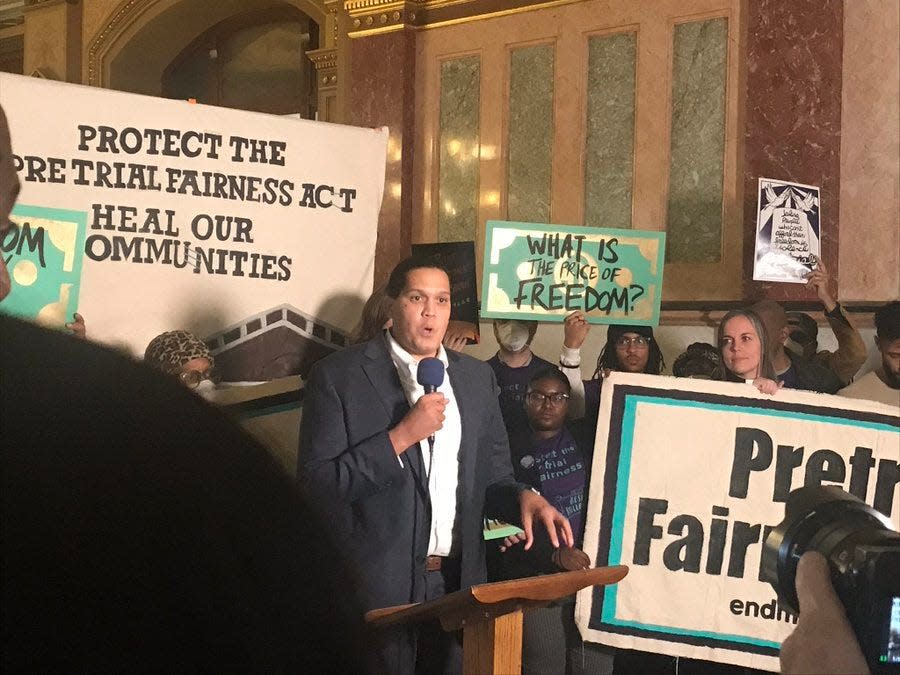Bill ending juvenile court fines, fees passes Senate vote

Legislation advancing out of the Illinois Senate this week is now one step closer to addressing an initiative pushed for years by juvenile justice reform advocates.
Senate Bill 1463 from state Sen. Robert Peters, D-Chicago, passed on Wednesday in a 37-19 vote and would eliminate the issuing of nearly all juvenile court fines and fees if signed into law by Gov. JB Pritzker.
Individuals under the age of 18 would still owe restitution for violations of traffic, boating, fishing or game law along with municipal ordinance violations. The bill has received its first reading in the state House of Representatives and is now in the House Rules Committee.
Senate Action: Senate votes to lift nuclear construction ban
Already eliminated in more than 20 states, advocates say the costs of the fines and fees especially impact families of color and lower income families. A recent report from the Illinois Statutory Court Fee Task Force recommended abolishment and found the assessments "undermine the goal of achieving rehabilitation."
"In the juvenile court system, youths living in poverty may face harsher consequences than their more well-off peers since poor children are less likely to pay juvenile assessments, which may result in contempt of court, probation violations, recidivism, and even additional fees," the report reads.
Peters previously attempted passing similar legislation in the prior General Assembly through Senate Bill 3621 - a bill that never advanced beyond first reading in the chamber. Fines typically range from $50 to $800, although sometimes much higher, according to the juvenile justice reform coalition Debt Free Justice Illinois.
Peters said the real impact is often felt when families have to take-on credit card debt to cover their fines and fees.
"One fee for someone who's working class leads to a variety of different other economic challenges that could cause a debt cycle or debt spiral," he said.
Still, Republicans voting against the bill were concerned that this would be a financial loss for counties. State Sen. Jill Tracy, R-Quincy, said during floor debate on Wednesday that Adams County, her home county, issued $22,000 in fines either last year or in 2021.
"That is a significant amount that somehow that county and that entity of government through their taxpayers is going to have to make up," she said.
All Senate Republicans voted against the bill. The Illinois Sheriff's Association also opposes the legislation.
The amount listed by Tracy for Adams County is "marginal," Peters added, since the county has an annual budget exceeding $60 million. The costs a county likely incurs in the process of collecting fees are also unnecessary, he believes.
Several counties, including the state's most populus Cook County and neighboring Morgan County, already do not order fines and fees. The average amount collected per county annually is about $786,000, according to DFJI, but this includes counties with much larger budgets such as Lake, DuPage and McHenry.
Recent: Senate passes gambling bills as industry expands
Annually, the money collected by less populous counties is typically less than $5,000. Sangamon County assessed $155,742 in fines and fees at the juvenile level between 2017 and 2021- collecting slightly more than $20,000 over the five-year span.
The bill in its current form has no means test, meaning that families regardless of income would not be subject to fines and fees. This was an issue brought up by Tracy, and, when asked later on Thursday, Peters said he would not support.
Peters argued a means test already effectively exists in the court system since wealthier families can afford lawyers that have greater ability to either reduce or outright eliminate fines and fees. The same reality does not exist for poor families, he said.
"We have an inequity of how representation happens in our court system to begin with," Peters said. "We shouldn't have that actually."
Peters' bill comes as activists call for youth detention centers to be shut down throughout the state. The governor announced plans to close five centers in 2020, although plans are moving forward with a new center in Lincoln.
![The Illinois Department of Juvenile Justice announced plans for the new Illinois Youth Center that will use a portion of the Lincoln Development Center grounds in Lincoln, Ill., Tuesday, February 2, 2021. [Justin L. Fowler/The State Journal-Register]](https://s.yimg.com/ny/api/res/1.2/OY4tAURIdK9nmwpWA2jVQA--/YXBwaWQ9aGlnaGxhbmRlcjt3PTk2MDtoPTY0MA--/https://media.zenfs.com/en/the-state-journal-register/850119e7321cb96edd4bc5897f3dc0cd)
SB 1463 has a companion bill in the House under House Bill 3120 from state Rep. Justin Slaughter, D-Chicago. The bill was re-referred to the House Rules Committee on Monday.
Contact Patrick Keck: 312-549-9340, pkeck@gannett.com, twitter.com/pkeckreporter.
This article originally appeared on State Journal-Register: Senate moves juvenile court fines and fees bill onto House

